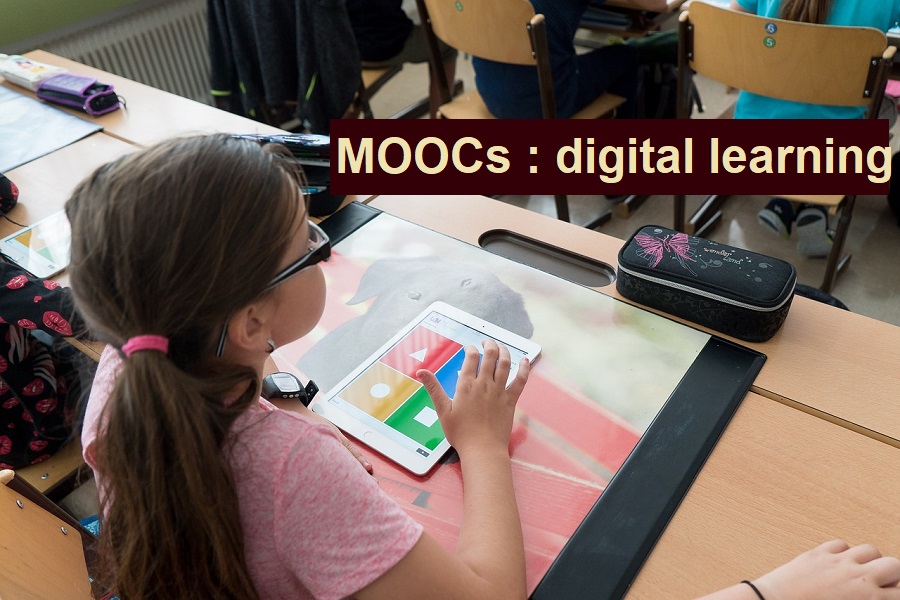A massive open online course (MOOC) is an online course that aims at unlimited participation by students and opens access via the web. MOOCs provide interactive user forums to support community interactions among students, professors and teaching assistants. MOOCs are a recent and widely re- searched development in distance education which were first introduced in 2008 and emerged as a popular mode of learning in 2012. The first MOOC emerged from the open educational resources (OER) movement. The term MOOC was coined in 2008 by Dave Cormier of the University of Prince Edward Island. It is a web-based platform which provides unlimited number of students world- wide with a chance of distance education with the best institutes in the world. Some of the notable providers of MOOCs are Stanford Online, Khan Academy, NPTEL (National Programme on Technology En- hanced Learning), Canvas Network, Udemy, Academic Earth, WizIQ, Future Learn, Coursera, Udacity, edX, NovoED, etc. These providers are either categorized as commercial or non-profit organizations rendering these services. The Indian Institutes of Technology (IITs) and Indian Institute of Science (IISc) offer online courses through NPTEL (India) platform which require no registration and are free of cost. IIT Delhi offers courses through WizIQ plat- form which requires registration and fees to study courses offered by them. The headquarters of Coursera, edX and Udemy platforms for online courses are based out of the USA.

Coursera is the topmost provider of MOOCs. Coursera was launched four years ago with an intention to make courses available for students or anybody who wants to learn, by offering them online. It offers online courses ranging from the sciences, i.e., physics and biology, to humanities, social sciences and even digital marketing, designing, etc. Coursera happens to be the top-most provider of MOOCs with over 2000+ courses to offer.
MOOCs as the modern version of educational broadcasting are the revolutionary change in the world of education. MOOCs are significant development in the field of education.
The key features are:
a) Massive: It has infinite accessibility. The huge numbers of students can enroll in this platform;
b) Open: It is open to all. It can provide a platform for maintaining open access for students.
If there is a particular course we want to pursue but cannot, we have an option of considering a MOOC for our chosen higher education path. There are no prerequisites for participants other than access to a computer/mobile device and the inter- net; c) Online: MOOCs are offered at least initially wholly online, but the students/participants can use MOOC materials in a blended format for use on campus. In other words, the institution provides learner support for the MOOC materials through the use of campus-based instructors. For instance at San Jose State University, on-campus students use MOOC materials from Udacity courses, including lectures, readings and quizzes, and then instructors spent class- room time on small-group activities, projects and quizzes to check progress; d) Courses: These are free online courses available for anyone to enroll. MOOCs provide on afford- able and flexible way to learn new skills, advance your career and deliver quality educational experiences at scale. Courses are offered in subjects like Architecture, Art and Culture, Business and Management, Education and Teacher Training, Electronics, Environmental Studies, Humanities, Law, Literature, Social Sciences, Science, Philosophy and Ethics, etc. MOOCs provide graduate level programme and online Master’s degree programme along with other professional certificate programmes.
It is an online platform where stu- dents and teachers come together and form an online pool of resources, which are readily available to utilize. The University Grants Commission (UGC) along with the HRD (Human Resource Development) Ministry has launched the MOOC programme in India for higher secondary, bachelor and master’s degrees. This will cover a wide range of subjects that may or may not be taught in regular campus studies. A new portal for MOOCs named ‘Study Webs of Active-Learning for Young Aspiring Minds’, in short, SWAYAM, is said to present students with an opportunity to study anything from a list of 2000 courses out of which 200 are currently available for registration. These online courses have been developed by a team of senior academicians and are expected to enhance the gross enrollment ratio in higher education without compromising with the quality. These courses will also help in bridging the digital divide in the country.
But, MOOCs cannot replace the traditional approach of classroom learning; it can only be used as an alternative method to bridge the gap between various schools of learning. It has been said however that MOOC has certain limitations. Although digitization is a must now, there are many nations that are unable to provide the basic necessities to enroll for MOOCs, hence, the spread of MOOCs is limited. It is not always certain that all MOOCs provide degrees, certificates and/or diplomas which limits the number of candidates that enroll for these courses as many companies ask for records of the education levels achieved and candidates are unable to provide them with the same. A student’s life is con- fined to one room that has internet access and a laptop or a computer which allows little or no interaction with the outside world. Since MOOCs are web-based, there is no monitoring of the candidates/students, which carries a risk of plagiarism or cheating.
MOOCs are focused on providing education that will improve skills in specific fields of study, mostly focused on technology, science and mathematics. Although some of the online courses provide records of completion of the courses, the on- line education concept is relatively new. It is found that students are ready for this new concept. However, many employers are still hesitant and skeptical about it. To summarize, MOOCs are a great plat- form for higher education not just in India but all over the world.